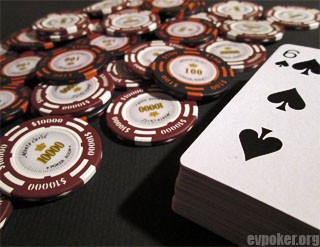EV (expected value)
 EV is an abbreviation for expected value. Regardless if you play poker, blackjack or on horses you always have an expected value for the outcome of your play. Most people who play poker or doing others sorts of gambling usually don’t know the exact conditions of the game they play.
EV is an abbreviation for expected value. Regardless if you play poker, blackjack or on horses you always have an expected value for the outcome of your play. Most people who play poker or doing others sorts of gambling usually don’t know the exact conditions of the game they play.
The meaning of EV and what is it good for?
The basic meaning of EV or expected value is the potential long-term equity in a specific situation. It can be applied on all sorts of things, but are often used in context of gambling.
Knowledge about the exact relations concerning EV when playing on lottery isn’t very important. Since it always is negative, it’s more about the hope for luck than the possibilities of getting a steady income by winning on a regular basis.
In poker, on the other hand, the situation is more dynamic. All decisions you make affects your results in some way. Opposite to lottery, in poker you can achieve a positive expected value. Not being aware of what your expectations are in a particular situation is a serious risk factor concerning your total result.
Positive and negative EV
There are positive and negative EV, and in some situations also the possibility of a neutral EV (+/- 0 EV). Positive EV means that you can expect a positive long-term result in a given situation and negative EV is the opposite. As a consequence, you want to bet as much as possible when you have a positive expectation and as little as possible when you have a negative expectation. Your guidance to this cause is the odds. Within every situation in poker there are odds of the possible outcomes. The more you know about the odds, the more times can you get an advantage, or, as gamblers put it: getting the best of it.
Let’s look at an example that show what EV is about ... You bet on rolling the dice: if you bet $1 you could win $4 on the numbers 1 and 2. If we make a calculating of this, we can see that you win $1.33 for every dollar you bet. (The 2 numbers will come up 1/3 of the times and when being worth $4, 0.33*4=1.33.) Here we can see that you have a positive expected value and you will earn money in the long run on this bet.
In poker, things are not as simple as in this example. Poker is a game of imperfect information and you cannot calculate what you don’t know. But through knowledge and experience you can make estimations that serve your calculations. Poker isn’t about to be sure, but to make the correct analysis.
You will for certain win in the long run in situations with positive EV in poker, and by short terms you will maybe win. The variance is, however, big from a short perspective and can be illustrated by graphs.
To always follow an approach that yields good winning chances is easy to formulate in words, but much more difficult to make a practice of in reality. This is because poker not only consist of mathematics and strategical elements, but also lots of psychology.
The EV perspective is the right way to approach gambling, including poker. Try to always think: "Do I have a positive EV or not?" and play only when you do have +EV. This can be applied to everything from table selection to a single call decision. In abstract terms, EV is everything in poker.
Risk aversion
The risk aversion differ between people. Whereas some doesn't like the idea to gamble that much, others willingly do just that provided that the odds are favorable.
People with high risk aversion are simply unsuitable for a game such as poker in which you must risk something to get something. Even if the gamble have a positive outcome in the long run some, not everyone likes the idea of a possible short run loss, especially if lots of money is on stake.
Any advantage player, a gambler looking for a mathematical edge to exploit before wagering on something, will accept taking big risks as long the outcome seems to be positive in the long run and that his bankroll can tolerate a loss. By only gamble in situations with minor risks, the potential winning prospect decrease.
A concrete example of this in Texas would be a player that do an over raise with a strong hand to “kill the hand”. He wants to win immediately. Sure, sometimes it's correct to protect the hand, but it's better to do that with calculated value bets than over bets.
Is it worth to gamble? Life situation and gambling
You bet $1,000.
First outcome (90% chance): you lose and must continue your day-to-day job. No life changing effect.
Second outcome (10% chance): you win $100,000 and can stop your day-to-day job. The life changing is a fact.
In this example, there are high risk and high probability to fail. However, the only thing that really changes the situation is the possibility success. Sure, it not fun indeed to lose $1,000, but here the thing is different. It’s not the absolute win or lose amount, it’s about the possibility for something to change in life.
The reason for this discussion is not to imply you to make risk, only to show a theoretical perspective of risk.
Related articles:
